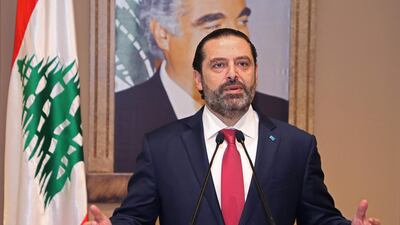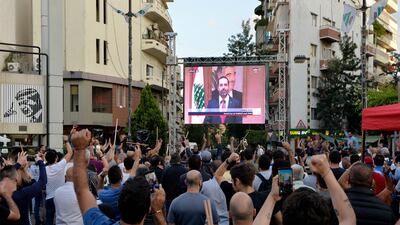The move by Prime Minister Saad Hariri to submit his resignation has made the situation in Lebanon “even more serious,” French Foreign Minister Jean-Yves Le Drian said after the announcement.
Mr Hariri’s resignation as prime minister would collapse the government, should President Michel Aoun accept it.
But Mr Aoun is saying he will hold consultations with political parties before he makes a decision.
This move could take time.
What should happen when a government collapses:
A government collapses when enough ministers walk out or the prime minister resigns. When the president accepts the resignations he instructs Cabinet to become a caretaker administration.
While the ministers stay on to oversee the daily functioning of the country, they make no major decisions and the Cabinet rarely meets.
The president conducts binding consultations with the parties in Parliament who offer their vote for the new prime minister, who must be a Sunni Muslim.
When a candidate is selected, they then hold their own negotiations with political parties in Parliament on the formation of government and the allotting of ministries.
Broadly speaking there is usually either a government of national unity, such as the current administration, that is representative of all the major parties in parliament, or there is a technocrat government.
When all parties agree, the prime minister advises the president that they are ready to form government.
The new administration meets to form a Cabinet that must get parliamentary backing to become official.
Will the president accept Mr Hariri’s resignation?

The current situation is not exactly normal. There is a large, sustained protest movement from across the country and the looming threat of financial meltdown.
Hezbollah leader Hassan Nasrallah said last week that he rejected any reshuffle of the current Cabinet or its resignation.
At this point, the party may advise Mr Aoun, its major Christian ally, not to accept the resignation.
Mr Aoun, local reports say, has also rejected any government shuffle in which his son-in-law and Foreign Minister, Gebran Bassil, is left out.
Mr Bassil has been a focal point of public anger, with chants against him at almost all of the early protests, so his remaining would be unpopular.
Sami Nader, director of the Levant Institute for Strategic Affairs, said it was technically in Mr Aoun’s power to reject Mr Hariri’s resignation but he was unlikely to do so.
“The simple fact is that the prime minister resigned and all the government is now considered a resigned government,” Mr Nader said.
So it is likely that the president will accept the resignation in the coming days.
Not doing so would set the country up for a major political crisis while offering no solution to the troubles it faces.
So, what will happen now?
This is unclear. While the protest movement has remained leaderless and diverse, what most seem to want is a new, non-political administration of technocrats with no parties represented.
It would be very hard to force the parties to accept this and to actively vote for it. But given the level of pressure from the continuing protests, anything is possible.
An alternative put forward by former prime minister Fouad Siniora, who leads Mr Hariri’s Future Movement parliamentary bloc, is for Cabinet to resign in favour of a government of technocrats led by Mr Hariri.
This would keep the man who drafted the plan to fix the country’s infrastructure and improve the financial situation, which is backed by $11 billion (Dh40.4bn) in grants and loans by the international community.
The money depends on significant reforms. Leaving Mr Hariri, who has said that parties in his government were effectively blocking the needed changes, in charge would allow him to carry out his plan.
But it might not placate those on the streets and Mr Hariri might not want to stay on.
It will also be hard to sell to the other parties in Parliament an administration in which he is the sole political representative.
Parties could also push to form another national unity government, but it is unclear if such a move would result in anything different to the current administration and would do little to ease public anger.
Mr Nader said that the current set up had only led to a financial collapse and declining services, and a new approach is needed.
But time is not on Lebanon’s side.
“In my view, Aoun will accept Hariri’s resignation because we’re in a deadlock, and actually this resignation is the only way to open the door for a solution,” Mr Nader said.
“With the current status quo, it was stirring up more tension in the street and polarising or radicalising the street more.”
He said that inaction was accelerating the financial collapse, which was spelt out plainly by central bank governor Riad Salameh on Monday night, when he said the government needed a plan in days.
Mr Nader said that the country needed “a new government that could restore what has been broken with the Lebanese people, and secondly re-establish the links and trust with the international community that Lebanon needs to find the support to get out from the financial crisis”.
Maha Yahya, director of Carnegie Middle East, said that Mr Hariri’s resignation gave protesters one of their key demands while forcing the other parties to take responsibility for future developments.














